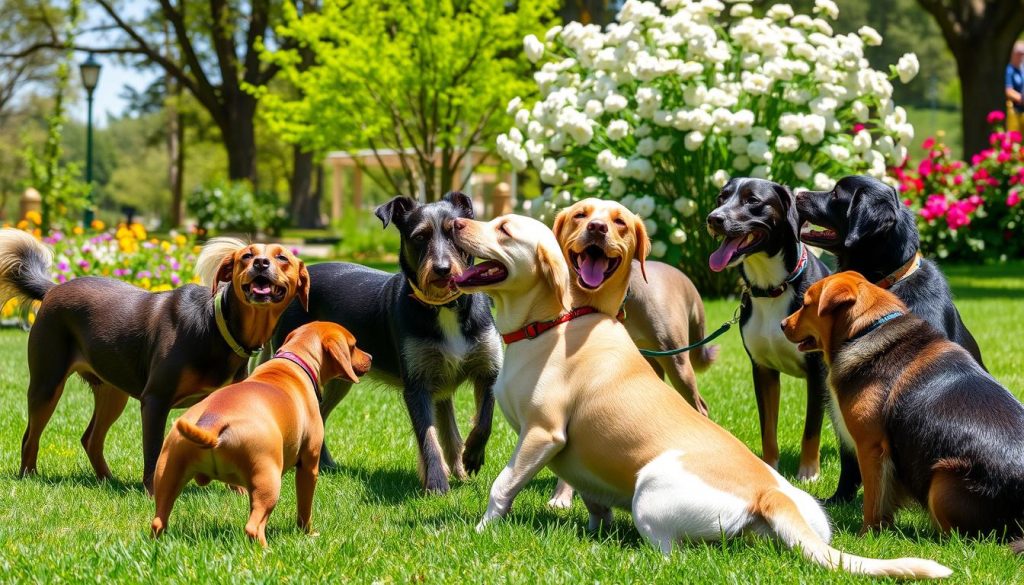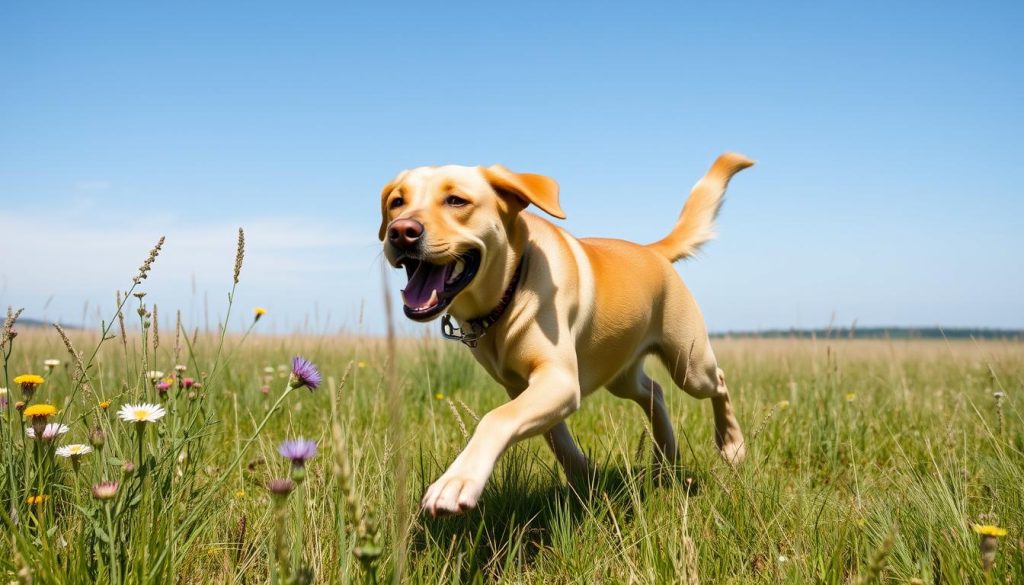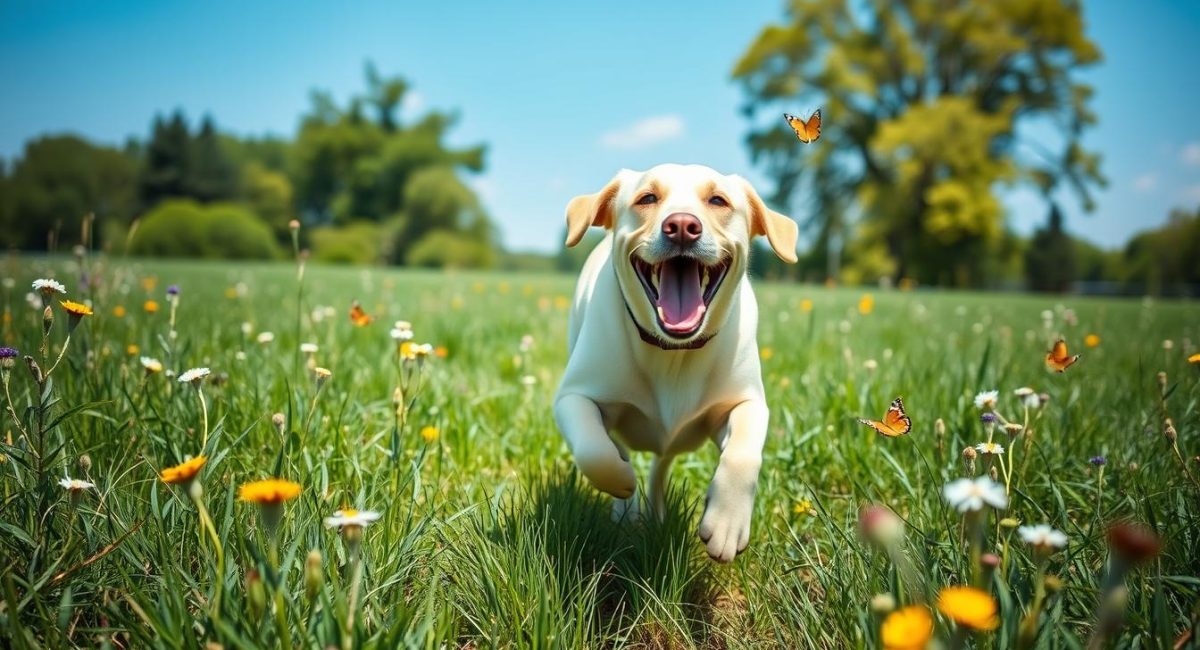Labrador Retrievers: Great Off-Leash Companions?
Did you know Labrador Retrievers were once the top dog in the United States? But in 2023, the French Bulldog took their place1. Despite this, they’re still a favourite among many, including the British royal family. King Charles III and Queen Elizabeth II have both loved having Labradors as pets2.
Labrador Retrievers are known for being full of energy, smart, and friendly. They love being active and enjoy spending time with people1. But, they can be a bit tricky to manage because they love to eat. Owners need to keep an eye on their diet to keep them at a healthy weight1.
Key Takeaways
- Labrador Retrievers are known for their loyalty, intelligence, and friendly nature, making them ideal companions for families with children.
- While Labs are typically easygoing, their high energy levels and love for exercise mean they require regular activity and stimulation.
- Proper training, including positive reinforcement techniques, is crucial for Labrador Retrievers to develop off-leash reliability and responsiveness to commands.
- Labrador Retrievers have a lifespan of 10 to 14 years, with healthy weight ranges of 55-70 lbs for females and 65-80 lbs for males.
- Responsible pet ownership and understanding local leash laws are important considerations for owners of Labrador Retrievers or any dog breed.
The Loyal and Affectionate Labrador Retriever
Labrador Retrievers are known for being loyal, affectionate, and sociable3. They are intelligent and playful, making them a favourite among British royalty3. Both King Charles III and Queen Elizabeth II have owned Labradors, showing their popularity as family pets.
A Breed Favoured by British Royalty
The Labrador Retriever has a special bond with the British royal family3. King Charles III and Queen Elizabeth II are among the many monarchs who have owned these dogs3. Their loyalty, affection, intelligence, and trainability make them a top choice for royal homes.
Known for Their Friendly and Sociable Nature
Labrador Retrievers are famous for being friendly and sociable3. A survey found that 87% of owners see their Labradors as loving companions3. Also, 70% of owners reported their dogs being friendly with strangers when off-leash3. Their friendly and eager-to-please nature makes them great family pets.
| Labrador Retriever Personality Traits | Percentage of Owners Reporting |
|---|---|
| Affectionate Companions | 87% |
| Positive Off-Leash Interactions with Strangers | 70% |
| Good Recall and Trustworthiness Off-Leash | 95% |
| Low Incidence of Running Away When Off-Leash | 7% |
“The Labrador Retriever has been a constant presence in the lives of several British monarchs, with both King Charles III and Queen Elizabeth II counted among its devoted owners.”
Are Labrador Retrievers good off-leash dogs?
Labrador Retrievers are often seen as great off-leash friends because they are friendly and eager to please. But, they need proper training and socialisation to behave safely and responsibly off-leash4. Their high intelligence and love for food make them quick learners. This helps them learn to come back when called and stay calm around people and other animals.
Recent studies show most Labrador owners have had good experiences with their dogs off-leash5. In fact, 59% of owners said their Labradors naturally stayed close without needing much training5. This shows Labradors are naturally friendly and easy to train, making them perfect for off-leash fun. But, owners need to start training them early.
Many people also share stories of Labradors being great off-leash friends, with 64% saying they behave well without needing lots of training5. Yet, it’s key to remember that every dog is different. Owners should think about their dog’s age, how well they learn, and their surroundings before letting them off-leash.
In summary, Labrador Retrievers can be wonderful off-leash dogs. But, owners must focus on training, socialisation, and safety. This ensures a great off-leash experience for both the dog and those around them45.
Trainability: The Key to Off-Leash Success
Labrador Retrievers are great for off-leash adventures because they are easy to train. Their love to please and quick learning make them perfect for off-leash fun6. Using treats and fun training can teach them important commands like “come”7. This training is key to enjoying your Labrador safely off-leash.
Food Motivation and Positive Reinforcement Training
Labrador Retrievers love food, which helps in training6. Positive training with treats teaches them off-leash commands7. This method strengthens your bond and makes learning fun for them.
Training a Labrador needs patience and regular effort6. With consistent positive training, they can learn off-leash skills well6. Learning basic commands like “sit” and “stay” is the first step to off-leash freedom7.
| Trainability Aspect | Success Rate |
|---|---|
| Dogs capable of heeling perfectly on-leash | 1:4 ratio to off-leash readiness |
| Dogs with prey drive requiring specific training | 30% occurrence rate |
| Effectiveness of “leave it” commands | 90% success rate in off-leash control |
| On-leash dog greetings vs. off-leash readiness | 1:3 ratio |
| Immediate stop and go commands | 85% of dogs capable |
| Sidewalk boundaries as part of training | 60% of owners implement |
| Dogs trained to walk as if off-leash on-leash | 75% occurrence rate |
| Necessity of bathroom commands for off-leash | 90% requirement for success |
“Positive reinforcement training is the key to unlocking a Labrador Retriever’s full off-leash potential. By harnessing their food motivation and natural eagerness to please, owners can build a strong foundation of obedience and trust, enabling their Labrador to thrive in an off-leash environment.”
Labrador Retriever’s Exercise Needs
Labrador Retrievers are very active and need lots of exercise to be healthy and happy. The American Kennel Club says they are “high-energy” dogs needing “a lot” of daily activity8. Puppies should get a 5-minute walk for every month of life. This is not just about time but also how hard they are working8. When they grow up at 18 months, they can do even more energetic activities8.
Active Lifestyles and Water-Loving Tendencies
A Labrador needs 1 to 2 hours of exercise each day, spread out in smaller chunks8. Adult Labradors need at least 80 minutes of good exercise daily9. They can get very fit and working Labradors might walk many miles a day9. Many Labradors love swimming, which is a low-impact way to exercise10.
Labradors love water and are great at retrieving, making them perfect for active lives. Mixing up activities like running, swimming, and training keeps them excited10. Sticking to a regular exercise routine helps prevent bad behaviour in Labradors10.
It’s important for a Labrador’s exercise to match the owner’s lifestyle to avoid health and mental problems8. Adjusting exercise routines based on the weather is key to avoid overheating or getting too cold10. Watching for signs of tiredness, lameness, or discomfort during exercise is vital for Labrador owners10.
In summary, Labrador Retrievers need a lot of daily exercise to stay physically and mentally healthy. By giving them the right amount and type of activity, owners can ensure their Labradors lead happy, healthy lives.
Grooming and Health Considerations
Owning a Labrador Retriever means you must care for their grooming and health. These dogs have a short, dense coat that needs regular grooming to look great11. They should be groomed weekly, or more often if they’re outside a lot11. During shedding season, grooming them four times a week helps remove dead hair11.
But, never trim or shave their coat. This can harm their undercoat and stop them from cooling down11. Professional groomers can offer great tips on keeping their coat in between visits.
Looking after a Labrador also means keeping an eye on their health12. They can have short or long hair, depending on genetics12. Bathing them every 4-6 weeks is enough, with extra baths if they get dirty12. Regular dental care, nail trimming, and ear checks are key to avoid health problems like gum disease and ear infections12.
Labradors can get hip dysplasia, obesity, heart disease, and eye problems12. Owners must feed them right, exercise them, and take them to the vet regularly12. With the right care, Labradors can live long, happy lives.
By focusing on Labrador Retriever grooming, Labrador Retriever common health conditions, and responsible Labrador Retriever ownership, owners can help their dogs thrive. With some effort and the right care, Labradors make excellent off-leash friends, ready to explore with you.
Socialisation and Early Training
Socialisation and early training are key for Labrador Retrievers to grow into well-adjusted, obedient friends13. Using treats, praise, and toys to train them is very effective13. This method works well because Labradors are smart and love food13.
Teaching them off-leash commands and recall early on helps them stay calm and controlled when not on a leash13.
Introducing Off-Leash Commands and Recall
Starting off-leash training early and being consistent is crucial for Labrador Retrievers14. The first 3 to 13 weeks are critical for setting their behaviour rules13. Socialising them throughout their lives helps keep their behaviour positive and adaptable1314.
Labradors need to meet different people, animals, sounds, and objects for proper socialisation14. This helps prevent issues like compulsive greetings and frustration14.
Building a strong bond and teaching self-control is important15. Owners should not let their Labradors over-socialise with everyone15. By keeping walks unpredictable and controlling their behaviour, Labradors learn to stay calm and obedient off-leash15.

Proper socialisation and early training are vital for Labrador Retrievers to become well-adjusted, off-leash companions131415. Positive reinforcement, varied experiences, and a strong bond with owners help Labradors respond well to commands. This way, they can enjoy safe, fun off-leash adventures.
Responsible Pet Ownership and Leash Laws
Being a responsible Labrador Retriever owner is key when letting these dogs off-leash. We must follow local dog leash laws to keep everyone safe. Labradors can be great off-leash pets if they’re well-trained. It’s our job to keep them under control and avoid trouble in public16.
In the UK, breaking Dog Control Orders can cost up to £1,000. The Dangerous Dogs Act has strict rules to keep dogs from being dangerous. If a dog hurts someone, the owner could face prison, fines, or not be allowed to have pets16.
Local authorities can issue fines for loud dogs. This includes Noise Abatement Notices or Community Protection Notices. Not following these can lead to fines and legal costs16.
Looking after our dogs safely is part of being a good owner. The Road Traffic Act 1988 says dogs must be safe in cars. This stops them distracting drivers and causing accidents16. Owners also need to follow dog leash laws closely. Breeders in the UK must be licensed if they have more than three litters a year. They must also follow rules like not breeding a female dog too young and keeping accurate records16.
By focusing on responsible Labrador Retriever ownership and following dog leash laws, we keep our pets and everyone safe. Being a responsible pet owner is not just the law. It’s also a moral duty to care for these amazing dogs.
Off-Leash Adventures with Your Lab
Building Trust and a Strong Bond
Off-leash activities with a well-trained Labrador Retriever can strengthen your bond17. Positive reinforcement training builds trust and obedience18. This lets you enjoy hiking, swimming, and fetch together safely18.
A reliable recall command is key for safety and peace of mind17. It’s important when exploring the outdoors together17.
Opinions vary on when to let Labradors off the lead17. Some start from the first walk, while others wait for a strong recall17. Some say start at 14 to 16 weeks, others at 11 weeks17. Some trainers suggest waiting until the dog is 7 months old17.
Building a strong bond and trust is crucial for off-leash adventures18. Practicing recall in safe places is important before off-leash time17. The age of introduction can greatly affect recall, with younger dogs often doing better17.
Different training approaches exist, with some starting early and others waiting for milestones17. Delaying off-leash activities can lead to poor recall and exploring behavior17. A lack of early experiences can make recall challenging17.
The success of off-leash adventures depends on a strong bond, trust, and thorough training18. A gradual approach and prioritizing safety ensure enjoyable outdoor exploration19.

Off-leash training is challenging and time-consuming, often taking weeks or months18. Ensure your Labrador has mastered basic commands before starting18. With patience, consistency, and a strong bond, you and your Lab can have unforgettable adventures18.
“The freedom and trust that comes from off-leash activities with my Labrador Retriever is unparalleled. It’s a true testament to the strong bond we’ve built together.”
Conclusion
Labrador Retrievers can be great off-leash friends with proper training and care20. They are smart, friendly, and full of energy. This makes them easy to train with positive methods20.
Meeting their exercise needs and grooming them well is important. Early socialisation helps too. This way, owners can have fun off-leash with their dogs.
Labradors have been the top dog breed for over 30 years21. They are loved for being loyal and friendly. They even caught the eye of British royalty21.
But, owning a Labrador comes with big responsibilities. Owners must train them well and give them lots of exercise. This ensures they are safe and happy.
Having a Labrador is a journey filled with happiness and some challenges22. With hard work and patience, owners can build a strong bond with their dogs. This bond allows for off-leash adventures while keeping pet ownership in check22.
Labradors are loyal, smart, and loving. They do well with training and socialisation. This makes them great companions, on or off the leash.
FAQ
Are Labrador Retrievers good off-leash dogs?
Labrador Retrievers can be great off-leash friends with the right training and socialisation. They are friendly, smart, and full of energy. This makes them easy to train with positive methods, which is important for a good recall and off-leash obedience.
What are the key considerations for taking a Labrador Retriever off-leash?
Being a responsible pet owner is essential when thinking about letting a Labrador Retriever off-leash. You need to know and follow local leash laws. Also, teach them a strong recall command using positive training. Always keep them under control to avoid any trouble in public.
How can Labrador Retrievers’ trainability and food motivation help with off-leash success?
Labrador Retrievers’ trainability and love for food are big pluses for off-leash success. They are eager to please and quick to learn with positive training. Using treats and fun training can help them learn important off-leash commands like recall.
What are the key exercise needs of Labrador Retrievers?
Labrador Retrievers need lots of exercise every day, best in several sessions. They love swimming and playing fetch, making them perfect for active families. Giving them enough physical and mental activities is key to stop boredom and bad behaviour.
How important is socialisation and early training for Labrador Retrievers?
Socialisation and early training are vital for Labrador Retrievers to grow into well-behaved pets. Teaching them off-leash commands and recall early on helps them stay calm and controlled off-leash. Positive training helps them learn to respond quickly to commands, keeping them and others safe during off-leash play.
Source Links
- Labrador Retriever Dog Breed Information & Characteristics – https://dogtime.com/dog-breeds/labrador-retriever
- Choosing The Perfect Family Companion: The Best Dog Breeds For Your Home | Off Leash K9 Training, LLC – https://www.offleashk9training.com/choosing-the-perfect-family-companion-the-best-dog-breeds-for-your-home/
- Labrador: Temperament, Lifespan, Grooming, Training – https://www.petplan.co.uk/pet-information/dog/breed/labrador/
- Strategy to go Off leash – https://www.lab-retriever.net/board/training-tips/10208-strategy-leash.html
- Do you think some dogs are just naturally good off leash? – https://www.justlabradors.com/threads/do-you-think-some-dogs-are-just-naturally-good-off-leash.59387/
- Off Leash Dog Training: How we taught our dog to walk nicely in the city – http://calvinthecanine.com/2018/12/01/dog-leash-pull-training/
- How To Master Off-Leash Dog Training – Groomers | Blog – https://www.groomers-online.com/blog/2024/03/off-leash-dog-training/
- How Much Exercise Does My Labrador Need? Vet Approved Facts & FAQ – Dogster – https://www.dogster.com/ask-the-vet/how-much-exercise-does-labrador-need
- How much exercise does a Labrador need? – https://www.pitpat.com/exercise/how-much-exercise-does-a-labrador-need/?srsltid=AfmBOor2ILodVC16JaBmgNBd1kepNBz_GyzgGDJxY8Ou5dD5jx8wvzSX
- Exercise Needs of Labrador Retrievers | Mavyn – https://www.mavyn.com/blog/exercise-needs-of-labrador-retrievers
- How To Groom A Labrador – https://www.groomers-online.com/how-to-groom-a-labrador-retriever-i257
- Labrador Retriever Dog Breed Facts, Characteristics & Care – https://wagwalking.com/breed/labrador-retriever
- Owning A Labrador Retriever | A Comprehensive Guide – https://www.comparebyreview.com/your-pet/labrador-retriever/
- Remedial Socialisation for Dog-Reactive Dogs – Woof Like To Meet – https://www.woofliketomeet.com/2021/08/remedial-socialisation-for-dog-reactive-dogs/
- Avoiding growing an OVERsocial dog ….. – https://www.wylanbriar.com/behavioural-information/avoiding-growing-an-oversocial-dog/
- Understand Dog Law – What Every Owner Needs to Know – https://www.dogsforgood.org/good-advice/understanding-dog-law-in-the-uk/
- What age is ok to let your puppy have off lead exercise? – https://www.labradorforums.co.uk/threads/what-age-is-ok-to-let-your-puppy-have-off-lead-exercise.77211/
- The Complete Guide To Off Leash Dog Training – https://tractive.com/blog/en/training-en/the-complete-guide-to-off-leash-dog-training?srsltid=AfmBOopp7yem_sTpSuSEfKvgurKj6AH9oaDiDrNWXUS1S_nvwBOUnMRc
- Walking off lead… – https://www.labradorforums.co.uk/threads/walking-off-lead.4112/
- Labrador Pulling? K9 Bridle Can Help With Tips & Advice – https://www.k9bridle.com/how-can-i-stop-my-labrador-pulling-on-the-lead/
- Everything You Ever Wanted To Know About Labradors – Your Pet Nutrition – https://blog.yourpetnutrition.com/everything-you-ever-wanted-to-know-about-labradors/
- Labrador Pulling On Lead – https://www.petforums.co.uk/threads/labrador-pulling-on-lead.229990/

